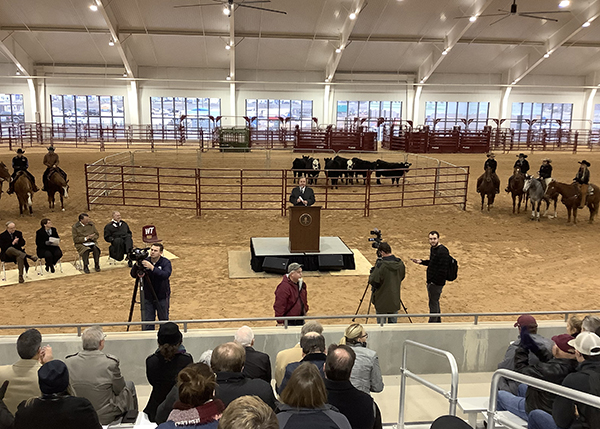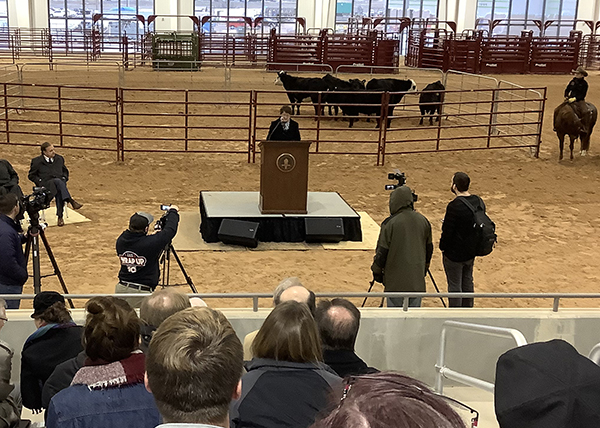Texas A&M System Partnership Announces Update To Veterinary Program In Texas Panhandle
Additional funding will support the increased faculty needed for VERO’s 2+2 program

CANYON, Jan. 28, 2020—Officials from The Texas A&M University System (TAMUS) announced on Jan. 28 a $5 million commitment to the developing 2+2 veterinary program through the Texas A&M College of Veterinary Medicine & Biomedical Sciences’ (CVM) Veterinary Education, Research & Outreach (VERO) program on West Texas A&M University’s (WT) campus.
The additional funding from TAMUS will be used to increase faculty members from five to 23 for the VERO program. Current faculty members were secured with the support of a Legislative Appropriations Request by the Texas Education Agency.
The VERO 2+2 program is a continuation of initiatives led by the TAMUS to support the state agriculture industry and the young people of Texas. In 2019, the System committed $90 million to the establishment of a 22,000-square-foot VERO facility to house the Doctor of Veterinary Medicine (DVM) curriculum and externship programs for the new clinical rotations in the Texas Panhandle, as well as the 2+2 program. The 2+2 program will allow Texas A&M veterinary students to elect to spend their first two years in Canyon on WT’s campus for increased exposure to large animal needs in rural communities.
“Texas A&M’s 100-year-old veterinary program is an established, accredited route for students seeking their D.V.M degree,” Walter V. Wendler, president of WT, said. “Paired with WT’s prime location for the cattle industry with ample opportunities to work with large animals through extern- and internships is a recipe for a prosperous veterinary services industry in Texas. We are thrilled with the seamless collaboration between these two campuses and eager to be a part of educating Texas A&M veterinary students on WT’s campus.”

The first cohort of fourth-year veterinary students will begin clinical rotations at the Agricultural Sciences Complex on WT’s campus starting Summer 2020. The first cohort of up to 18 first-year veterinary students will begin their DVM education at the VERO in Fall 2021.
Every year after, there will be two cohorts at one time cycling through the Canyon location before their third year at the CVM in College Station, with the option of returning to Canyon a portion of their fourth-year clinical rotations.
“Through our VERO program, Texas A&M, the CVM, and WT are prioritizing the need for rural and food animal veterinarians, needs that affect citizens of the Texas Panhandle and citizens in rural communities across the state,” said Dr. Eleanor M. Green, the Carl B. King Dean of Veterinary Medicine at Texas A&M.
“Our VERO educational team, led by Dr. Dan Posey, is working to meet these needs by helping West Texas A&M gather and mentor regional students, to help them produce the best veterinary school application possible. In just three and a half years, under Dr. Posey’s leadership, the number of successful veterinary college applications from West Texas A&M has tripled,” Green said. “The next step is to bring them back home to serve their hometowns in the Texas Panhandle region, and the 2+2 program will be a key part of this critical next step.”
Combining the power of the two campuses’ resources will expose students to unique, diverse learning opportunities in a large state with some underserved regions. Faculty of the VERO program encourage incoming students to engage locally and consider working in communities that have a greater need for a large animal veterinarian.
“We are pleased to expand our veterinary medicine and biomedical sciences program to the campus of West Texas A&M University,” Texas A&M President Michael K. Young said.
“The increased funding will provide support and be of great benefit to all Texans. The 2+2 program will especially benefit large-animal care needs that are often isolated and will enhance the educational and medical care opportunities for rural Texans.”
Approval by the Texas Higher Education Coordinating Board, The Texas A&M University System Board of Regents and the Council of Education of the American Veterinary Medical Association to finalize the program is pending.
For more information about the VERO 2+2 program, contact Posey at dposey@wtamu.edu.
###
Media contacts: Jennifer Gauntt, Director, CVM Communications, College of Veterinary Medicine & Biomedical Sciences at Texas A&M, (979) 862-4216, jgauntt@cvm.tamu.edu; Brittany Castillo, West Texas A&M University, (806) 651-2682, bcastillo@wtamu.edu.


